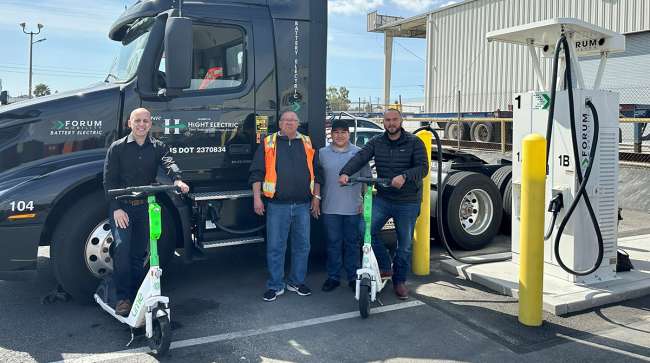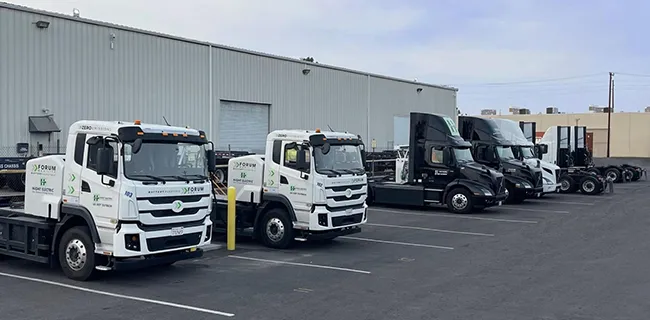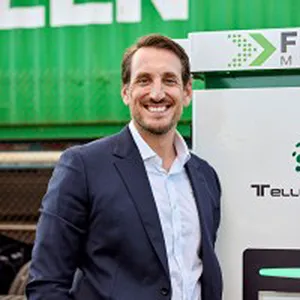Fast Company
Hight Logistics to Use EVs for Micromobility Company Lime

[Stay on top of transportation news: Get TTNews in your inbox.]
In the past, when a shipment of electric bikes or scooters arrived at the Port of Los Angeles for the micromobility company Lime, the goods would leave on diesel trucks. But when the next shipment arrives later this month, it will be delivered to a distribution center on an electric truck instead.
Hight Logistics, a local trucking company, now has an agreement to make all of Lime’s deliveries from the port on zero-emission vehicles. It’s a deal that more brands are likely to make as they try to shrink their overall carbon footprints—and it’s possible because the ports of Los Angeles and Long Beach are quickly changing.
A new mandate in California says that all drayage trucks — trucks that typically make short journeys from ports to warehouses — will have to be zero-emission by 2035. To help reach that goal, new trucks sold this year also have to be zero-emission. Still, right now, only around 246 of the state’s 218,490 registered drayage trucks are battery-electric.
When the regulation was proposed, “We said, wow, how are we going to do this? Where are we going to get the trucks? I had no idea where to even begin,” says Rudy Diaz, CEO of Hight Logistics.

Forum Mobility trucks at the port. (Lime)
In 2021, the company began working with Forum Mobility, a startup that aims to make it easier for trucking companies to transition. In many cases, Forum provides electric trucks as a service; it owns the trucks, taking care of the financing and paperwork for incentives, and also builds out charging infrastructure. One large new charging depot at the port, with room to charge around 200 trucks a day, will be breaking ground in a few weeks. Hight happened to have a facility with the right wiring to install charging equipment itself, and also purchased some trucks, but Forum helped guide the company through the process. Hight, which has 45 diesel trucks in its fleet, now uses six electric trucks, and will have 20 by the summer.
The trucks charge overnight at Hight’s facility 10 miles from the ports, and can easily make a delivery on a single charge. Most trips are around 80 miles out and 80 miles back, Diaz says. Other drayage companies typically make similarly short trips.

Matt LeDucq says, "We cannot force truckers to get into a new truck and lose money." (LinkedIn)
It’s critical for the system to work well for truckers. “We cannot force truckers to get into a new truck and lose money,” says Matt LeDucq, CEO of Forum Mobility. “These are small businesses, these are the folks that move our goods. We need to be able to do this from an actual execution standpoint, but also we have to do this in a way that’s equitable to the folks doing the work.”
Electric trucks are much more expensive than the diesel equivalent, but incentives and tax breaks bring the cost down. Because companies also save on fuel costs, the switch can still compete with diesel, Diaz says. The price that Lime will pay for electric deliveries is similar to what it would have spent otherwise.
For Lime, it’s one step in its overall plan to reach net-zero emissions as a company by 2030. That includes all “Scope 3” emissions, like shipping. Other aspects of logistics will take longer; zero-emission ocean freight is just beginning to emerge. Lime plans to use zero-emission ocean shipping for 10% of its shipments by 2030, and 100% by 2040. Long-distance electric trucking isn’t feasible yet, though new alternatives are also emerging in that space — like electric attachments that can be added to diesel trucks and swapped out along the journey rather than taking hours to charge. But electric drayage is feasible now. Lime plans to set up a similar agreement at the Port of Rotterdam, where its shipments for European cities arrive.
Want more news? Listen to today's daily briefing above or go here for more info
“We feel it’s incredibly important for businesses like Lime that have cargo to ship to send out the signal that there is demand out there,” says Andrew Savage, Lime’s VP of sustainability. “Irrespective of a given state’s regulatory choices, we want to see demand for decarbonization of this sector. One thing we’ve clearly recognized is that we can’t do this alone — we won’t meet our goals if the sectors around us, from manufacturing to logistics, don’t decarbonize themselves.”
Other companies are likely to adopt similar commitments to use EVs for deliveries from the port. “We’ve talked to cargo owners for years, and all of them have been like, ‘Yeah, that sounds cool — let me know when there are some trucks,’ ” LeDucq says. “If you’re the CEO of an electric vehicle company, the number of times you say ‘chicken or egg’ each week is astonishing. But companies like Lime are now doing this because the trucks are there.”
Distributed by Tribune Content Agency, LLC




